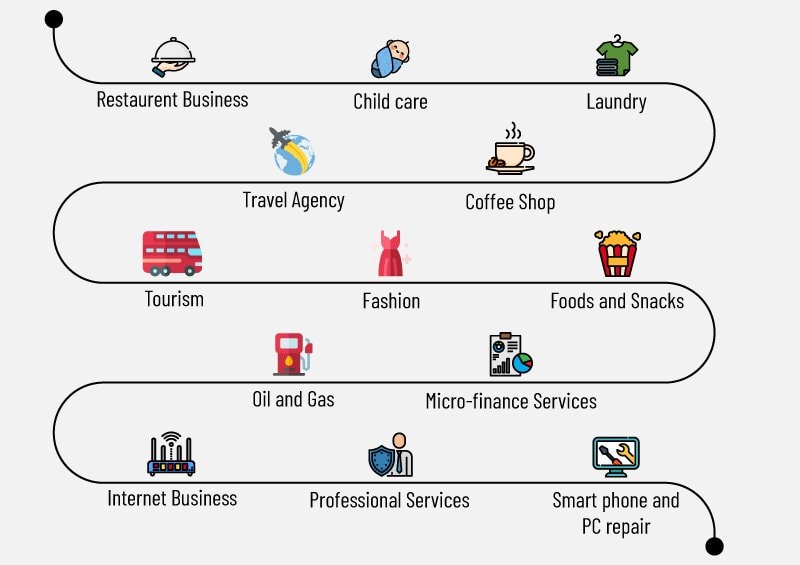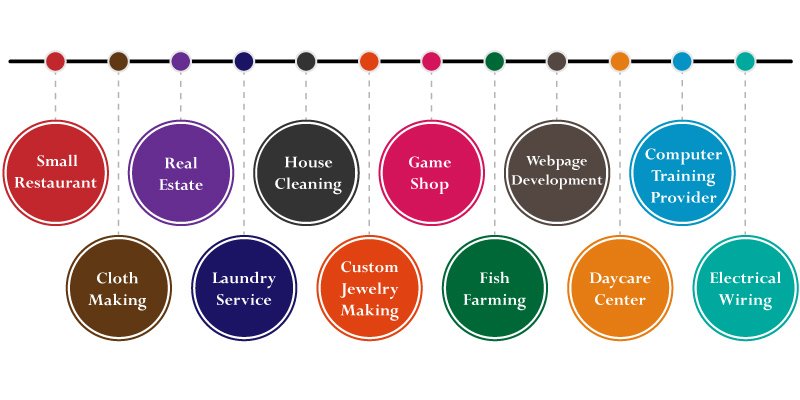To start a small business in Malaysia, register your company with the Companies Commission of Malaysia (SSM). Obtain necessary licenses and permits.
Malaysia offers a vibrant business environment for entrepreneurs. Its strategic location, robust infrastructure, and supportive government policies make it an attractive destination for small businesses. Registering your company with the Companies Commission of Malaysia (SSM) is the first essential step.
After registration, securing the necessary licenses and permits specific to your business type is crucial. Malaysia’s diverse market and skilled workforce provide ample opportunities for growth. With a clear business plan and proper legal compliance, you can successfully establish your small business in Malaysia. Engaging with local business communities and staying informed about market trends will further enhance your business prospects.
Entrepreneurial Ambitions In Malaysia
Malaysia is a thriving hub for entrepreneurs. The country offers a dynamic environment for small businesses. The government provides numerous incentives to support new startups. Aspiring entrepreneurs find Malaysia a fertile ground for their ventures. Let’s explore why Malaysia is attractive for startups and look at success stories of Malaysian small businesses.
Why Malaysia Is Attractive For Startups
- Strategic Location: Malaysia is located in the heart of Southeast Asia.
- Economic Stability: The country has a stable economy with steady growth.
- Government Support: Various grants and incentives are available for startups.
- Skilled Workforce: Malaysia boasts a highly skilled and multilingual workforce.
- Infrastructure: The country has excellent infrastructure and connectivity.
- Quality of Life: Malaysia offers a high quality of life at a low cost.
Success Stories Of Malaysian Small Businesses
Malaysia is home to many successful small businesses. These stories inspire new entrepreneurs.
| Company | Industry | Key Achievement |
|---|---|---|
| Grab | Ride-hailing | Expanded across Southeast Asia |
| FashionValet | Fashion E-commerce | Leading fashion platform in Malaysia |
| JobStreet | Recruitment | One of the top job portals in Asia |
These companies started small and grew rapidly. They leveraged Malaysia’s unique advantages.
Whether in tech, fashion, or recruitment, Malaysian businesses have made a mark. Their journeys show that with the right support and vision, success is achievable in Malaysia.
Legal Requirements For Starting A Business
Starting a small business in Malaysia can be exciting. But, you must know the legal requirements. These steps ensure your business runs smoothly and legally.
Choosing The Right Business Structure
First, choose the right business structure. There are several options:
- Sole Proprietorship: Simple and easy. You are the only owner.
- Partnership: Two or more people share ownership.
- Limited Liability Partnership (LLP): Partners have limited liability.
- Private Limited Company (Sdn. Bhd.): Separate legal entity. More complex but offers protection.
Each structure has pros and cons. Choose one that fits your needs.
Registration Process And Legalities
Next, register your business with the Companies Commission of Malaysia (SSM). Follow these steps:
- Pick a unique business name.
- Check name availability on the SSM website.
- Submit the Business Name Approval Form.
- Fill out the Business Registration Form.
- Pay the registration fee.
After registration, get the necessary licenses and permits. These may include:
- Business premise license
- Signboard license
- Industry-specific licenses
Ensure you comply with all regulations. This includes taxes, employee laws, and safety standards.
| Business Structure | Key Features |
|---|---|
| Sole Proprietorship | Single owner, simple setup |
| Partnership | Multiple owners, shared responsibility |
| LLP | Limited liability, flexible |
| Private Limited Company | Separate entity, complex |
Each step is crucial. Ensure all paperwork is correct. This helps avoid legal issues later.
Crafting A Robust Business Plan
Starting a small business in Malaysia requires a robust business plan. This plan acts as a roadmap to guide your business towards success. A well-crafted business plan includes essential elements like market research and financial projections.
Market Research Fundamentals
Conducting market research is crucial. Understand your target market and identify your competitors. Analyze their strengths and weaknesses. Know what products and services they offer. This helps you identify market gaps and opportunities.
- Identify your target audience
- Understand customer needs and preferences
- Analyze competitors’ strengths and weaknesses
Use surveys, interviews, and online research tools. Collect data and insights. This will help you make informed decisions. Your market research should answer questions like:
- Who are your potential customers?
- What are their buying habits?
- What price range are they comfortable with?
Financial Projections And Budgeting
Financial projections are essential for any business plan. They show potential investors the financial viability of your business. Budgeting helps you allocate resources efficiently.
| Expense Category | Estimated Cost (MYR) |
|---|---|
| Initial Setup | 5,000 |
| Marketing | 2,000 |
| Operations | 3,000 |
Prepare detailed financial projections. Include income statements, cash flow statements, and balance sheets. Break down your budget into categories. This helps you track expenses and control costs.
Consider potential risks and create contingency plans. This ensures your business can survive unexpected challenges. Financial projections and budgeting build confidence in your business plan.
Financing Your Venture
Starting a small business in Malaysia requires proper financing. Whether you have personal savings or need external funding, understanding your options is crucial. Let’s explore the available choices to fund your new venture and the local investment climate.
Options For Funding
There are several funding options for small businesses in Malaysia. These include personal savings, bank loans, and government grants.
- Personal Savings: Using your own money is a common way to start. It gives you full control over your business.
- Bank Loans: Many banks in Malaysia offer loans to small businesses. Check their interest rates and repayment terms.
- Government Grants: The Malaysian government provides grants to support small businesses. Look into programs like TEKUN and SME Corp Malaysia.
- Angel Investors: These are individuals who invest in startups. They can offer capital and advice.
- Venture Capital: Venture capital firms invest in high-growth potential startups. They seek equity in return.
- Crowdfunding: Platforms like Kickstarter allow you to raise small amounts from many people. This can help gauge public interest in your product.
Understanding Local Investment Climate
Malaysia has a vibrant investment climate for small businesses. The government supports entrepreneurship through various initiatives.
Key aspects of the local investment climate include:
| Aspect | Description |
|---|---|
| Government Support | Grants, loans, and incentives are available for new businesses. |
| Business-Friendly Policies | Malaysia has policies that encourage business growth. |
| Skilled Workforce | The country has a well-educated and skilled labor force. |
| Infrastructure | Malaysia offers excellent infrastructure for business operations. |
| Market Access | Businesses in Malaysia have access to regional and global markets. |
Understanding these aspects will help you navigate the investment landscape. It is essential to research and leverage local resources effectively.
Finding The Ideal Location
Choosing the right location is crucial for your small business in Malaysia. Your business’s success greatly depends on its accessibility, visibility, and surrounding environment. Let’s dive into some key factors to consider when selecting your business location.
Key Considerations For Site Selection
When selecting a location, think about your target audience. Are they likely to visit your business? Ensure the area has enough foot traffic. Also, check the local competition. Being close to competitors might be risky. Consider the costs involved. Prime locations are expensive. Balance your budget with your needs.
Evaluate the infrastructure. Is there good public transport? Is there ample parking space? Look at the local amenities. Proximity to banks, restaurants, and other facilities can benefit your business. Ensure the area is safe. High crime rates can deter customers. Consider the zoning laws. Ensure your business type is permitted in the area.
Leasing Vs. Buying Property
Deciding between leasing and buying property is vital. Each option has its pros and cons.
| Leasing | Buying |
|---|---|
| Lower initial costs | Higher initial investment |
| Flexibility to move | Long-term stability |
| No property ownership | Building equity |
| Maintenance handled by landlord | Responsible for maintenance |
| Rent may increase | Fixed mortgage payments |
Leasing offers lower initial costs. It’s suitable for new businesses. Leasing provides flexibility. You can move if needed. But, you don’t own the property. Rent might increase over time.
Buying involves a higher initial investment. You own the property, providing long-term stability. Ownership allows you to build equity. But, you must handle maintenance. Mortgage payments are usually fixed.

Credit: onesearchpro.my
Building A Strong Brand
Starting a small business in Malaysia requires more than just a great idea. Building a strong brand is crucial for success. A strong brand sets you apart from competitors. It creates a lasting impression on your customers. Let’s dive into the essentials of building a strong brand.
Developing A Brand Identity
Your brand identity is the face of your business. It includes your logo, colors, and overall design. These elements should reflect your business values. Consistency in your brand identity builds trust. Follow these steps to create a strong brand identity:
- Define Your Brand Mission: What do you stand for?
- Research Your Audience: Know who you are targeting.
- Create a Unique Logo: Make it simple yet memorable.
- Choose Brand Colors: Colors should evoke emotions related to your brand.
- Develop Brand Guidelines: Ensure consistency across all platforms.
Effective Marketing Strategies
Once your brand identity is set, focus on marketing. Effective marketing strategies will help your brand reach its audience. Here are some cost-effective marketing strategies:
| Strategy | Description |
|---|---|
| Social Media Marketing | Engage with your audience on platforms like Facebook and Instagram. |
| Content Marketing | Create valuable content that educates and entertains your audience. |
| Email Marketing | Send newsletters to keep your audience informed and engaged. |
| SEO | Optimize your website to rank higher on search engines. |
Implement these strategies to build a strong and recognizable brand. Your efforts will pay off as your business grows.
Recruitment And Team Building
Starting a small business in Malaysia requires building a strong team. Recruitment and team building are crucial steps. This section will guide you through hiring the right talent and creating a positive work culture.
Hiring The Right Talent
Hiring the right talent is essential for business success. Use these steps to find the best candidates:
- Define job roles: Clearly outline job responsibilities and required skills.
- Advertise effectively: Use job boards, social media, and local networks.
- Screen candidates: Review resumes and conduct initial interviews.
- Conduct thorough interviews: Ask relevant questions to assess skills and fit.
- Check references: Verify past employment and performance.
- Offer competitive packages: Provide attractive salaries and benefits.
Creating A Positive Work Culture
A positive work culture boosts employee morale and productivity. Follow these tips to create a great work environment:
- Encourage open communication: Promote transparency and feedback.
- Recognize achievements: Celebrate successes and reward hard work.
- Provide growth opportunities: Offer training and career advancement.
- Foster teamwork: Organize team-building activities and events.
- Ensure work-life balance: Respect personal time and offer flexible hours.
- Create a comfortable workspace: Ensure the office is welcoming and functional.
Building a solid team and fostering a positive work culture are key to your small business’s success in Malaysia.

Credit: www.sfconsulting.com.my
Navigating The Regulatory Landscape
Starting a small business in Malaysia involves understanding and complying with various regulations. This section will help you navigate the regulatory landscape effectively.
Compliance With Local Laws
Ensuring compliance with local laws is crucial for any business in Malaysia. The first step is to register your business with the Companies Commission of Malaysia (SSM). This process includes:
- Choosing a business structure (e.g., sole proprietorship, partnership, or company).
- Filing the necessary registration forms.
- Paying the required fees.
Once registered, obtain the necessary licenses and permits. This may include:
- Business premise license
- Signboard license
- Sector-specific licenses
It’s essential to follow zoning regulations. Confirm your business location complies with local zoning laws.
Taxation And Business Incentives
Understanding taxation is vital for your business’s success. Malaysia has a straightforward tax system. Key taxes include:
- Corporate income tax
- Goods and Services Tax (GST)
- Personal income tax (for business owners)
Register for a tax identification number (TIN) with the Inland Revenue Board of Malaysia (LHDN). This ensures you’re compliant with tax regulations.
Malaysia offers several business incentives to encourage entrepreneurship:
- Pioneer Status
- Investment Tax Allowance
- Reinvestment Allowance
These incentives can significantly reduce your tax burden. They can also provide financial support during your business’s early stages.
| Incentive | Benefit |
|---|---|
| Pioneer Status | Partial or full tax exemption for 5-10 years |
| Investment Tax Allowance | 60%-100% allowance on capital expenditure |
| Reinvestment Allowance | 60% allowance on qualifying capital expenditure |
Consult with a tax professional to maximize these benefits. They can guide you through the application process and ensure compliance.
Launching Your Business
Launching your business in Malaysia can be an exhilarating experience. This phase marks the transition from planning to actual operations. The key to a successful launch lies in thorough preparation and strategic marketing efforts. Here’s how you can ensure a smooth and impactful launch.
Preparation For The Grand Opening
Preparation is critical for a successful grand opening. Ensure you have all necessary permits and licenses. Check that your business location is ready and well-maintained. Here’s a checklist to help you prepare:
- Ensure all legal documents are in order.
- Prepare the physical location for customers.
- Stock inventory and supplies.
- Train staff for their roles.
Consider a soft opening before the grand event. This helps identify any issues that need fixing. Invite a small group of customers and gather feedback.
Initial Marketing And Promotion Efforts
Effective marketing is essential to attract customers. Utilize both online and offline marketing strategies. Here are some methods to consider:
| Marketing Strategy | Description |
|---|---|
| Social Media Campaigns | Use platforms like Facebook, Instagram, and Twitter to create buzz. |
| Local Advertising | Place ads in local newspapers, radio, and community boards. |
| Promotional Offers | Offer discounts or freebies to attract initial customers. |
Build a website for your business. Ensure it is user-friendly and informative. Optimize it for search engines to attract organic traffic. Engage with your audience through email newsletters and social media posts. Encourage customers to leave reviews and share their experiences.
Collaborate with local influencers and bloggers. They can help spread the word about your business. Host an opening event and invite local media. This can generate valuable publicity.
Growth And Expansion Strategies
After setting up your small business in Malaysia, focus on growth and expansion. Implementing effective strategies ensures sustainable development. This section explores key methods to scale and expand your business.
Scaling Your Business
Scaling a business involves increasing its capacity and capability. Here are some strategies to help you scale your business:
- Automate Processes: Use software to automate repetitive tasks.
- Outsource Tasks: Hire freelancers or agencies for specialized tasks.
- Hire Skilled Employees: Invest in talent to drive growth.
- Enhance Customer Service: Use CRM systems to manage interactions.
- Expand Product Line: Introduce new products or services.
| Strategy | Benefit |
|---|---|
| Automate Processes | Saves time and reduces errors |
| Outsource Tasks | Access to specialized skills |
| Hire Skilled Employees | Boosts productivity |
| Enhance Customer Service | Improves customer satisfaction |
| Expand Product Line | Increases revenue streams |
Exploring New Markets
Exploring new markets can significantly boost your business. Follow these steps to enter new markets:
- Market Research: Identify potential markets and understand their needs.
- Analyze Competition: Study competitors in the new market.
- Localize Your Offerings: Adapt products to suit local preferences.
- Form Partnerships: Collaborate with local businesses.
- Leverage Digital Marketing: Use social media and SEO to reach new customers.
By implementing these strategies, your small business in Malaysia can achieve significant growth and expansion.
Leveraging Technology And Innovation
To succeed, leverage technology and innovation in your small business. Embrace new digital tools to stay competitive in Malaysia’s tech-driven market.
Adopting Digital Tools
Adopt digital tools to streamline your business operations. Use accounting software to manage finances efficiently. Tools like QuickBooks or MYOB can help.
Implement Customer Relationship Management (CRM) systems to track customer interactions. Popular CRM options include Salesforce and Zoho CRM.
Utilize project management tools to organize tasks. Tools like Trello and Asana are great for this purpose.
Consider using e-commerce platforms to sell products online. Platforms like Shopee and Lazada are widely used in Malaysia.
Staying Competitive In A Tech-driven Market
Stay competitive by understanding market trends. Monitor competitors using tools like SEMrush and Ahrefs.
Invest in digital marketing to reach more customers. Use Google Ads and Facebook Ads for targeted campaigns.
Focus on SEO to improve your website’s visibility. Optimize your content with keywords relevant to your industry.
Embrace social media to engage with your audience. Platforms like Instagram and Facebook are effective for this.
Keep up with the latest technology trends. Attend workshops and seminars to stay informed.
| Digital Tool | Purpose | Examples |
|---|---|---|
| Accounting Software | Manage finances | QuickBooks, MYOB |
| CRM Systems | Track customer interactions | Salesforce, Zoho CRM |
| Project Management Tools | Organize tasks | Trello, Asana |
| E-commerce Platforms | Sell products online | Shopee, Lazada |

Credit: www.sfconsultingbd.com
Overcoming Challenges And Setbacks
Starting a small business in Malaysia can be rewarding. Yet, it comes with its own set of challenges and setbacks. Knowing how to overcome these hurdles can make a big difference. This section covers common pitfalls and strategies for resilience.
Common Pitfalls For New Businesses
Many new businesses face similar problems. Here are some common pitfalls:
- Financial Issues: Cash flow problems can cripple a new business.
- Poor Planning: Lack of a solid business plan leads to failure.
- Market Research: Failing to understand the market can result in losses.
- Competition: Underestimating competitors can be disastrous.
- Customer Retention: Losing customers can hurt growth.
Strategies For Resilience And Recovery
Facing setbacks is part of the journey. Here are some strategies to build resilience:
- Adaptability: Stay flexible and ready to change direction.
- Financial Planning: Keep an emergency fund for tough times.
- Strong Network: Build relationships with mentors and peers.
- Continuous Learning: Stay updated with industry trends.
- Customer Feedback: Listen to your customers and improve.
Implementing these strategies can help your business survive and thrive.
Frequently Asked Questions
What Is The Easiest Business To Start In Malaysia?
The easiest business to start in Malaysia is an online retail store. Low startup costs and high demand drive success. Popular platforms include Shopee and Lazada. Selling local products or dropshipping can yield quick profits. Minimal overhead and flexible hours make it ideal for beginners.
Can Foreigners Start A Business In Malaysia?
Yes, foreigners can start a business in Malaysia. They must register with the Companies Commission of Malaysia. A local partner or director is required. Business visas are necessary. Research industry regulations beforehand.
How To Set Up A Small Business In Malaysia?
Register your business with the Companies Commission of Malaysia (SSM). Obtain necessary licenses and permits. Open a local bank account. Ensure compliance with tax regulations by registering with the Inland Revenue Board. Consider hiring local employees and setting up a physical office.
How Can I Start A Business From Home In Malaysia?
To start a business from home in Malaysia, first choose a business idea. Then, register your business with the Companies Commission of Malaysia (SSM). Obtain necessary licenses and permits. Set up a home office, and use online marketing to reach customers.
Manage finances carefully.
Conclusion
Starting a small business in Malaysia can be rewarding. Follow these steps to ensure success. Research, plan, and stay compliant with local regulations. With dedication and smart strategies, your business can thrive. The Malaysian market offers numerous opportunities for entrepreneurs ready to seize them.
Take the first step today and build your dream business.



